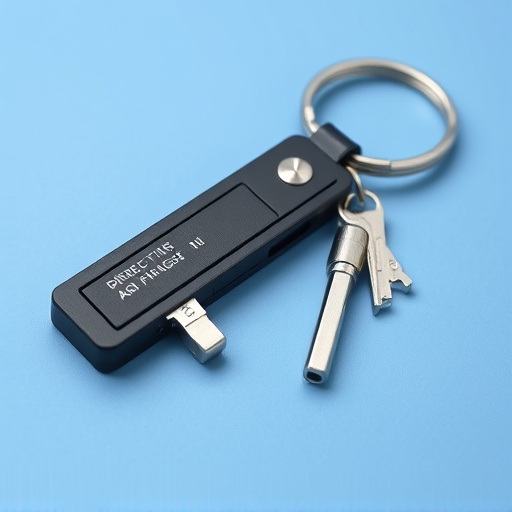The Pocket Sized Keychain Defense Weapon (PPD) offers compact personal safety for everyday carry. Legal regulations vary by US state; understanding laws is crucial for legal possession. PPDs provide discreet deterrence with sharp edges or pepper spray. Choose comfort, discretion, and legality; check local rules before purchasing.
“In today’s unpredictable world, personal safety is paramount. Introducing the pocket-sized keychain defense weapon—a sleek, legal carry option that fits seamlessly into your everyday life. This compact device offers a powerful solution for those seeking added security.
Our article delves into ‘Understanding Pocket Sized Keychain Defense Weapon,’ exploring its capabilities and appeal. We provide a comprehensive guide to ‘Legal Carry States,’ detailing where these devices are permitted. Additionally, we highlight the advantages of keychain devices for personal safety and offer tips on choosing the right self-defense tool. Navigate legalities with our expert advice on carrying your keychain weapon responsibly.”
- Understanding Pocket Sized Keychain Defense Weapon
- Legal Carry States: A Comprehensive Overview
- Keyring Device Benefits for Personal Safety
- Choosing the Right Self-Defense Keychain
- Navigating Laws: Carrying a Keyring Weapon Legally
Understanding Pocket Sized Keychain Defense Weapon
A Pocket Sized Keychain Defense Weapon, often referred to as a keyring self-defense tool, is a compact and innovative solution for personal safety, designed to fit comfortably on your keys. These devices are typically small enough to slip into your pocket or purse, making them easily accessible in various situations. They offer a discreet yet powerful way to deter potential attackers, providing peace of mind while you’re on the go.
These weapons are engineered with a focus on simplicity and effectiveness. The design often includes a sharp edge or point that can be used to strike or cut in case of an emergency. Their compact nature doesn’t compromise power; instead, it ensures that you have a personal defense tool readily available when needed, without drawing unnecessary attention in public spaces.
Legal Carry States: A Comprehensive Overview
In the United States, the concept of “legal carry states” refers to places where citizens are permitted to openly or concealed carry a pocket-sized keychain defense weapon, often referred to as a keyring gun or personal protection device (PPD). These states have laws allowing individuals to protect themselves and their loved ones while going about their daily lives. The availability and regulations around these small, easily concealable weapons vary significantly from state to state, with some offering more liberal provisions while others have stringent requirements.
Understanding which states permit the carry of pocket-sized keychain defense weapons is crucial for individuals seeking legal protection. These devices are designed for personal safety in situations where traditional self-defense options may not be readily available or effective. Whether for outdoor activities, travel, or simply living in a state with high crime rates, knowing one’s rights and the specific laws governing these weapons can empower citizens to take an active role in their security and peace of mind.
Keyring Device Benefits for Personal Safety
A pocket-sized keychain defense weapon, or keyring device, offers a discreet yet powerful tool for personal safety. Its compact design allows for easy carry on your keys, ensuring you’re always prepared in potential dangerous situations. These devices provide an added layer of protection, giving users the confidence to navigate unfamiliar areas or late-night walks with peace of mind.
The benefits extend beyond physical security; they also serve as a psychological deterrent. The mere presence of such a device on one’s person can deter would-be assailants, promoting a sense of safety and well-being. With their lightweight and unintrusive nature, keyring defense weapons are ideal for everyday carry, empowering individuals to protect themselves anywhere, anytime.
Choosing the Right Self-Defense Keychain
When considering a pocket-sized keychain defense weapon, it’s crucial to choose one that suits your needs and complies with local laws. Look for features like a sharp blade or a compact pepper spray option, ensuring it fits comfortably in your hand and easily slips into your pocket or bag. The best choice will offer both discreteness and effectiveness, allowing you to feel secure while navigating unfamiliar places.
Consider factors such as ease of use, reliability, and the level of protection it provides. A reputable brand with positive reviews can be a reliable indicator of quality. Additionally, familiarize yourself with the legal carry restrictions in your state or region to ensure you’re making an informed decision that aligns with the law.
Navigating Laws: Carrying a Keyring Weapon Legally
Navigating state laws regarding weapon possession is an essential step in understanding how to carry a pocket-sized keychain defense weapon legally. Each U.S. state has its own set of regulations governing firearms, including small, concealed defensive tools like keyring weapons. It’s crucial to research and familiarize yourself with the specific rules in your state or any place you plan to travel.
Many states allow the carry of pocket-sized keychain defense weapons under certain conditions, such as ensuring they meet size and functionality criteria. Some states have “right-to-carry” laws, which enable licensed individuals to conceal and carry handguns, including keyring weapons, while others may have stricter regulations or require permits for open or concealed carry. Always stay informed about local ordinances and consult official resources or legal experts for precise guidance on legal carry requirements.
The pocket-sized keychain defense weapon has emerged as a popular and legal self-defense option in many states. By understanding the benefits, choosing the right device, and navigating local laws, individuals can exercise their right to carry a protective keyring for personal safety. Armed with knowledge, you can make an informed decision about this convenient and discrete self-defense tool.
